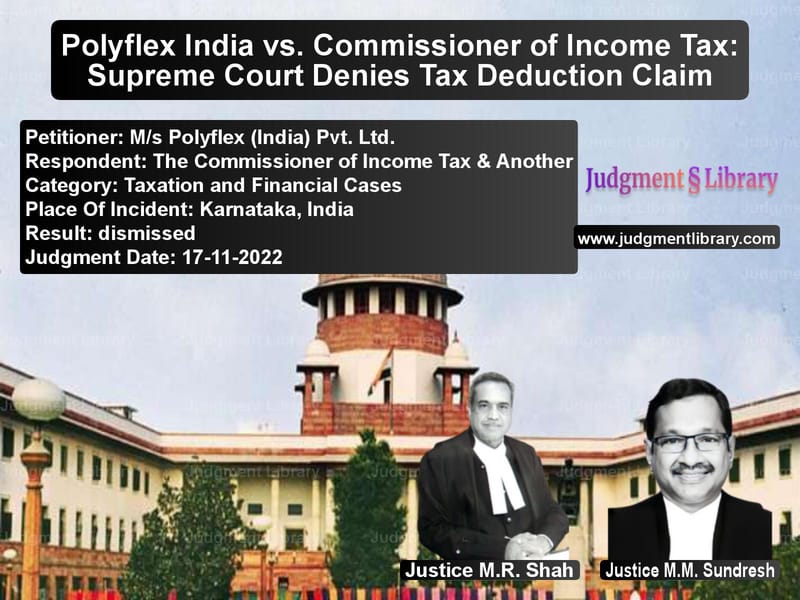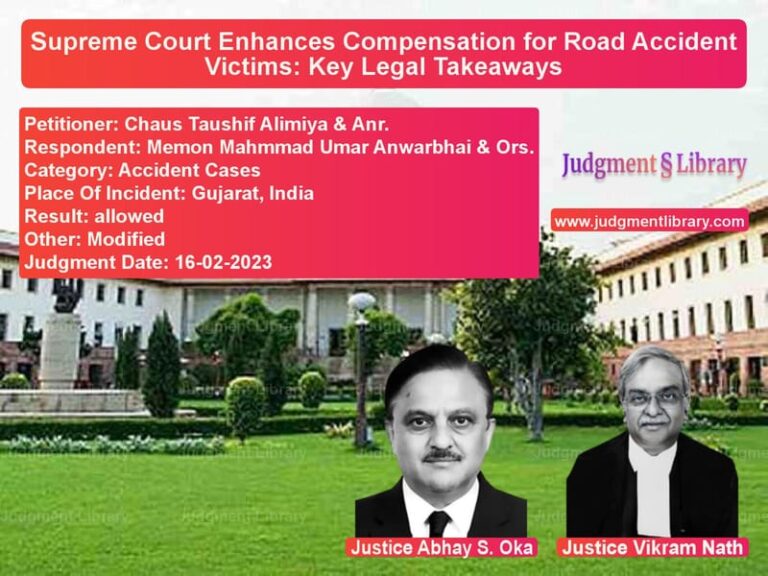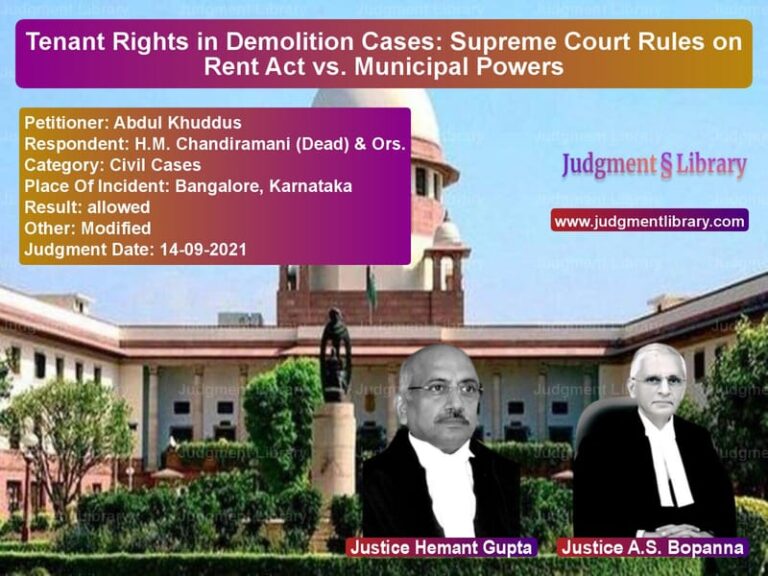Polyflex India vs. Commissioner of Income Tax: Supreme Court Denies Tax Deduction Claim
The Supreme Court of India recently ruled on the case of M/s Polyflex (India) Pvt. Ltd. vs. The Commissioner of Income Tax & Another, addressing the eligibility of the appellant for tax deductions under Section 80-IB of the Income Tax Act, 1961. The case hinged on whether the company’s product—polyurethane foam used in automobile seats—qualified as an industrially manufactured article distinct from its raw materials, thereby making it eligible for tax benefits. The Supreme Court upheld the Karnataka High Court’s judgment, rejecting the company’s claim.
The ruling clarifies the interpretation of Section 80-IB and sets an important precedent on how manufacturing activities are classified for tax exemption purposes.
Background of the Case
Polyflex India Pvt. Ltd. is a manufacturing unit engaged in the production of polyurethane foam, a key component in automobile seating. The company sought tax deductions under Section 80-IB, which grants incentives to small-scale industrial units engaged in manufacturing activities. However, the Income Tax Department denied the claim, arguing that polyurethane foam is covered under Entry 25 of the Eleventh Schedule of the Income Tax Act, which disqualifies certain items from availing deductions.
Polyflex India challenged the assessment order, arguing that its final product was an automobile seat, distinct from polyurethane foam. While the Income Tax Appellate Tribunal (ITAT) ruled in favor of the company, the Karnataka High Court overturned the decision, siding with the Revenue Department.
Arguments by the Parties
Appellant (M/s Polyflex India Pvt. Ltd.)
- Contended that their manufactured product was automobile seats, which are different from polyurethane foam.
- Argued that polyurethane foam is only an input material, which undergoes a transformation process to become automobile seats.
- Cited the company’s excise classification, where the product was taxed as automobile seats and not raw polyurethane foam.
- Referred to previous judicial precedents supporting the classification of end products rather than intermediate materials for tax purposes.
Respondent (Income Tax Department)
- Maintained that Polyflex India was engaged in manufacturing polyurethane foam, which falls under Entry 25 of the Eleventh Schedule.
- Argued that no significant transformation process was undertaken to qualify the end product as a distinct article separate from its raw materials.
- Highlighted that the company was selling foam pieces in various sizes and shapes, not fully assembled automobile seats.
- Emphasized that the Karnataka High Court had correctly identified the business activity as manufacturing polyurethane foam, not automobile seats.
Observations by the Supreme Court
The Supreme Court carefully analyzed the product’s classification and the manufacturing process. Key observations included:
- The manufacturing process did not involve significant modifications beyond producing polyurethane foam in different shapes and sizes.
- The final product was still recognized as polyurethane foam in commercial transactions.
- Polyurethane foam falls within Entry 25 of the Eleventh Schedule, which explicitly disqualifies items from Section 80-IB deductions.
- Just because the product is used in automobile seating does not mean it qualifies as a finished automobile seat.
The Court quoted:
“The manufactured article must be a commercially distinct product from its raw material. Polyurethane foam remains fundamentally unchanged in its composition, even when cut or molded into different sizes.”
Final Verdict
The Supreme Court dismissed the appeal and ruled as follows:
- Polyflex India was not entitled to tax deductions under Section 80-IB.
- The Karnataka High Court’s judgment denying the tax benefit was upheld.
- The ruling reaffirmed that a manufacturer’s product must be commercially distinct from its raw materials to qualify for tax exemptions.
Impact of the Ruling
This decision sets an important precedent for tax claims related to manufacturing activities. Key takeaways include:
- Strict Interpretation of Tax Laws: The Court has reinforced the importance of adhering to the exclusions listed under the Income Tax Act.
- Raw Material vs. Finished Product: Businesses must demonstrate substantial transformation of raw materials to qualify for tax benefits.
- Uniformity in Tax Treatment: The ruling ensures consistency in classifying manufacturing units across industries.
Conclusion
The Supreme Court’s ruling clarifies the scope of Section 80-IB and provides much-needed guidance on how manufacturing activities should be classified for tax purposes. By upholding the Karnataka High Court’s decision, the Court has ensured that tax benefits are granted only to businesses that genuinely manufacture new and distinct products.
This decision will have far-reaching implications for industries that rely on intermediate manufacturing processes and seek tax exemptions under similar provisions.
Petitioner Name: M/s Polyflex (India) Pvt. Ltd..Respondent Name: The Commissioner of Income Tax & Another.Judgment By: Justice M.R. Shah, Justice M.M. Sundresh.Place Of Incident: Karnataka, India.Judgment Date: 17-11-2022.
Don’t miss out on the full details! Download the complete judgment in PDF format below and gain valuable insights instantly!
Download Judgment: ms-polyflex-(india)-vs-the-commissioner-of-supreme-court-of-india-judgment-dated-17-11-2022.pdf
Directly Download Judgment: Directly download this Judgment
See all petitions in Income Tax Disputes
See all petitions in Tax Refund Disputes
See all petitions in Banking Regulations
See all petitions in Judgment by Mukeshkumar Rasikbhai Shah
See all petitions in Judgment by M.M. Sundresh
See all petitions in dismissed
See all petitions in supreme court of India judgments November 2022
See all petitions in 2022 judgments
See all posts in Taxation and Financial Cases Category
See all allowed petitions in Taxation and Financial Cases Category
See all Dismissed petitions in Taxation and Financial Cases Category
See all partially allowed petitions in Taxation and Financial Cases Category







